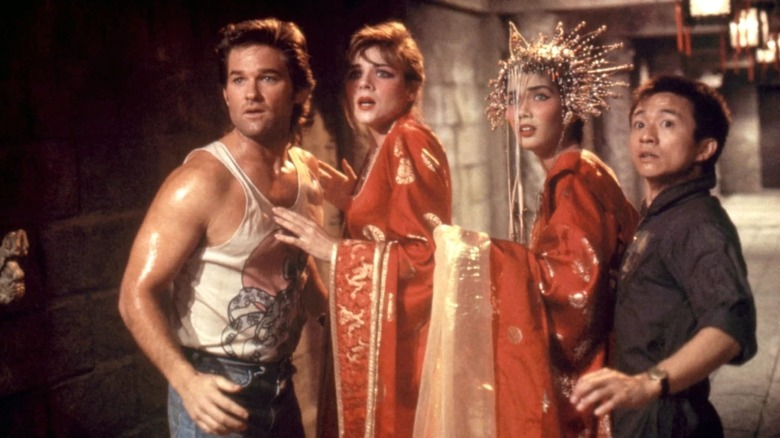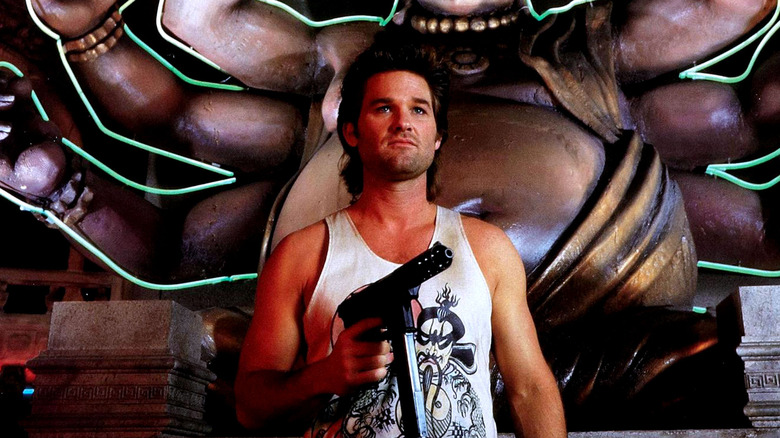Why Kurt Russell Sidelined His Own Character In Big Trouble In Little China
The main gag of John Carpenter's 1986 fantasy flick "Big Trouble in Little China" is that the sidekick seems to think he's the main character. The main character of the story is Wang Chi (Dennis Dun), a restaurant owner who cannot wait to meet his fiancée Miao Yin (Suzee Pai). Miao Yin, however, is kidnapped by the Lords of Death, a San Francisco street gang. Wang follows them to Chinatown hoping to rescue his fiancée, only to discover that she was passed to David Lo Pan (James Hong), an ancient Chinese sorcerer who aims to sacrifice her on a magical alter and break a ghostly curse he suffers from. Wang gathers old friends, each of them possessing knowledge of magic and ancient Chinese sorcery, to trek into the magical underworld in order to defeat Lo Pan and rescue Miao Yin.
Oh yeah, and Jack Burton (Kurt Russell) is there. Jack is a none-too-wise, wise-cracking truck driver who sometimes hangs around with Wang and whose truck is taken in the kidnapping kerfuffle. Jack is a noisy American blowhard with no knowledge of Chinese magic and no positive qualities other than charm and the type of bravery that comes with extreme ignorance. From Jack's behavior, he seems to think that "Big Trouble in Little China" is all about him. No one bothered to tell Jack that he was Wang's sidekick.
Jack is even sidelined from the film's climax, comedically spending it face-down, unconscious, on a slab of concrete.
Keeping Jack out of the final fray, it seems, was Russell's idea. In Entertainment Weekly's 2016 oral history of "Big Trouble in Little China," Russell admitted that he's never been very good at hand-to-hand combat, and felt he wouldn't have contributed much. It was more fitting that Jack stay knocked out.
Russell preferred to spend Big Trouble's climax unconscious
Jack's distance from the central story of "Little China" is highlighted during the film's climactic magical battle. Jack, hoping to get the drop on some back guys, leaps from a hiding place, startling them with a loud shout and a few bullets fired from his machine gun, straight into the ceiling. Jack, however, accidentally shoots down some stones from overhead and he is konked on the head. He spends a good portion of the climax unconscious on the ground.
In the EW interview, Russell admitted to his lack of fighting prowess and recalled making a suggestion to Carpenter:
"I couldn't do the chop-sockey. I had to come up with ways to not be involved. So, I said to John, 'How about if we come in here, and I'm all excited, and hit the machine gun, and rocks fall on my face, and I'm out?' Jack's out for the first two minutes of the fight that's 10 minutes long, whatever. And then he gets into the fray, and sure enough he stabs this big guy, but the guy falls in a way that's crushing Jack, and he can't move. I was just constantly finding things like that."
Indeed, Jack does get to land the final death blow to one of the film's bad guys, although, as Russell noted, he doesn't get to do it with dignity. One of the reasons "Big Trouble in Little China" is so funny is because Jack thinks he's cooler than he is. Russell is a charming, cool actor, but "Little China" shoulders him with a bumbling sidekick role. Even when he gets to land a kiss on Kim Cattrall at the end of the film, she leaves a big lipstick smear on his mouth that he's unaware of.
It's a great film.

